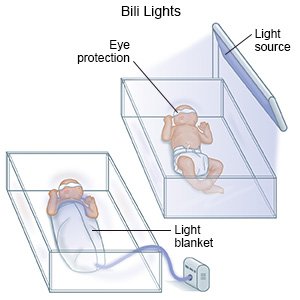Phototherapy for Jaundice in Newborns
Medically reviewed by Drugs.com. Last updated on Aug 4, 2025.
Phototherapy is light treatment for newborn jaundice. Jaundice is yellowing of your newborn's eyes and skin. It is caused by too much bilirubin in the blood. Bilirubin is a yellow substance found in red blood cells. It is released when the body breaks down old red blood cells. Bilirubin usually leaves the body through bowel movements. Jaundice happens because your newborn's body breaks down cells correctly, but it cannot remove the bilirubin. The light used for phototherapy helps your newborn's body get rid of extra bilirubin. Phototherapy may be done at home. Your newborn may need phototherapy in the hospital if the jaundice is severe.
 |
DISCHARGE INSTRUCTIONS:
Seek care immediately if:
- Your newborn has a fever higher than 100.4°F (38°C) for more than 30 minutes.
- You cannot raise your newborn's temperature above 96°F (35.6°C) after 30 minutes.
- Your newborn has trouble feeding, or he or she will not feed at all.
- Your newborn begins to vomit forcefully, or his or her vomit is yellow.
- Your newborn is hard to wake up.
Related medications
Call your newborn's pediatrician if:
- Your newborn's jaundice gets worse.
- Your newborn's jaundice is not gone by the time he or she is 14 days old.
- You think your newborn is not drinking enough breast milk, or he or she is losing weight.
- Your newborn does not want to breastfeed or drink formula.
- Your newborn has pale, chalky bowel movements.
- You have questions or concerns about your newborn's condition or care.
Follow up with your newborn's pediatrician as directed:
Write down your questions so you remember to ask them during your newborn's visits.
© Copyright Merative 2025 Information is for End User's use only and may not be sold, redistributed or otherwise used for commercial purposes.
The above information is an educational aid only. It is not intended as medical advice for individual conditions or treatments. Talk to your doctor, nurse or pharmacist before following any medical regimen to see if it is safe and effective for you.
Further information
Always consult your healthcare provider to ensure the information displayed on this page applies to your personal circumstances.
